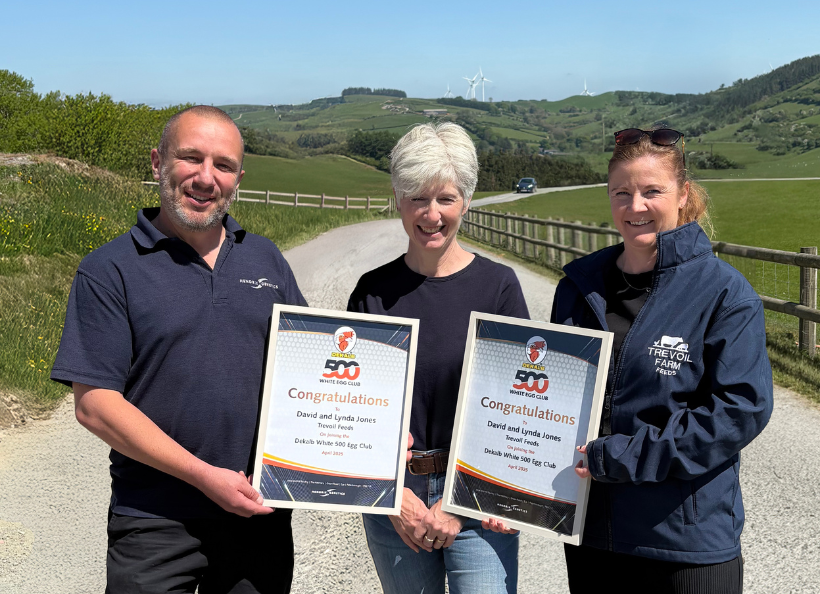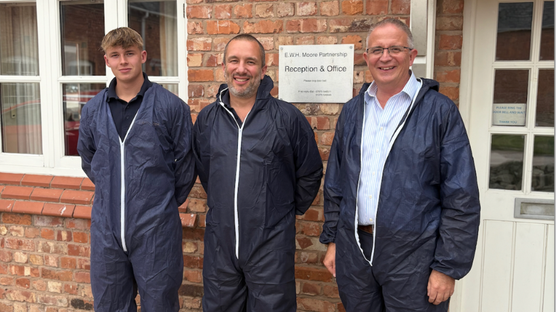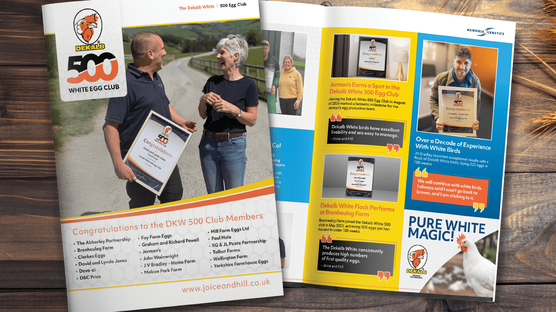
Published on June 16, 2025
Dekalb White Layers Live Up to Their Reputation in Multi-Breed Comparisons at DL & LJ Jones Farms in Powys
When their first flock of Dekalb Whites arrived in September 23, David and Lynda Jones had four different breeds of white and brown layers on the farm - giving them a unique opportunity to compare their performance and behaviours in a “real life experiment”. In December 24, they became an exclusively white bird operation.
David Jones’ parents started farming at Ddol Farm in the 50s, concentrating on beef and sheep. Keen to diversify, in 2002 David and Lynda took their first steps into egg production, buying a Harlow 12,000 flatbed poultry house, starting out with a flock of Columbian Blacktails, now known as British Blacktails.
“It all started when we saw an advertisement for John Bowler, who at the time didn’t have any farms in Wales.” Lynda explains “We spoke to David’s parents about the opportunity and soon became the first Bowler’s site in Wales. Without John we wouldn’t have got into poultry, and we couldn’t have done it without their help and support. In fact, we used to run open days for Bowlers to help other people follow our journey into egg production.”
The next step for the business was a planning application at Upper Esgair Farm, where David’s parents were living at the time. Over time the business grew, and David and Lynda now have five houses in total and are helped in the business by their family and Assistant Farm Manager, Heather Brick, who also grew up on a farm, and has been with them for six years.
Starting out as flat decks, all but one of the sheds have been converted from a capacity of 12,000, to multi-tier units of 32,000, with the conversion of the remaining flat deck system under consideration. The preferred system is Big Dutchman. “It’s rocket proof, you pay more, but it’s a stronger system and the leading system in the market.” Lynda states.
In 2006 and 2009 two further houses were built for organic egg production, at a time when the market was crying out for organic eggs. Then the organic market fell back, and the sheds went back to free range, after just one cycle. So, by 2010 all production was back to free range, with the first flock of Dekalb Whites, hatched by Joice and Hill, arriving in 2023.
“We moved to whites because we are always looking to improve, and we had heard of the reputation of Dekalb Whites.” explains Lynda “The timing of the white birds’ arrival meant we had concurrent flocks of brown and white birds. In fact, each of 4 houses had a different breed and this created a real-life experiment, allowing us to compare white to brown birds.
“The whites were noticeably easier to manage, the Dekalbs came into lay much quicker and were in full production whilst the browns were just starting. Now we have had one full cycle of white birds I can say they are definitely easier, with less floor eggs and less dirty eggs. It makes everyone feel better including the lad that works the shed, and it allows you to spend more looking after the birds rather than dealing with problems.”
As Heather Brick puts it, “Spending time with the birds is so important. It’s vital to take time to recognise their normal behaviours so you can spot changes. You can tell a lot from noise levels, and I can literally spend hours listening to birds – in the end its about husbandry and learning and common sense – you get out what you put in. For me, the Dekalb Whites definitely do give us more time to look after the birds.”
“In addition to attention to detail,” Lynda adds “one big thing is water, which is one of the most important factors in bird health. We work with Sophie at Applied Bacterial Control who put auto flushing in all sheds, once a day before the birds get up. It ensures fresh water every morning.”
David and Lynda are convinced white birds are the way forward. As Lynda says, “The longer cycles and fewer turnrounds have got to be better for the environment, and better for producers in financial terms, and less time spent managing issues.”
In 2015 the business left Bowler. As David Jones puts it, “We had grown in confidence, so we wanted to make our own decisions, and we had plans for a feed business. We have had great support from Simon and Penny at Joice and Hill, and from Cathy Baker at Oaklands Eggs. We have 25 years’ experience now, but things change and having constant good support makes everyone’s life easier – there is a lot to remember.”
Trevoil Farm Feeds
After leaving the Bowler family, David and Lynda started Trevoil Farm Feeds in 2018. “With the number of birds we have it made sense, so we went abroad to look at systems and we now have our own onsite Big Dutchman feed mill producing 30,000 tons per year.” David says, “We have seen the effects of disruption and volatility in feed prices – now we have complete control.
“Consistency of feed and matching each customers’ requirements is key. We buy raw materials in, with Premier Nutrition providing the formulations required by different customers. We deliver across Hereford and Shrewsbury, which keeps it local. Less road miles are better for the environment and means a lower cost for the egg businesses we supply.”
Group photo left to right: Simon Bowden, Lynda Jones and Heather Brick



